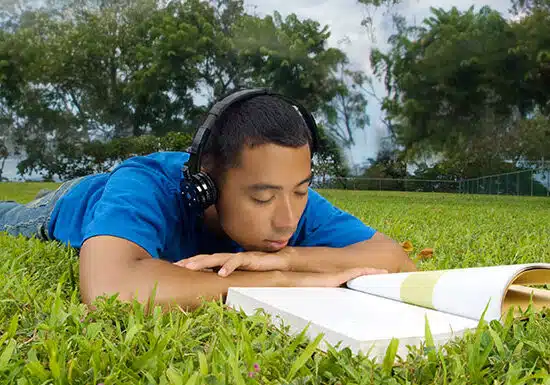Sleep Deprivation in College Students: How to Cope
Updated: June 19, 2024

Did you know that 37% of people ages 20-39 report lack of sleep? Sleep deprivation in college students is a common occurrence because it takes a lot to manage balancing work, life, and school. When it comes to sleep, it is recommended that adults get 7-9 hours of sleep a night because sleep promotes proper mental, physical and psychological well being.
Often times, college students are either too stressed or too busy to get the proper amount of sleep. This is especially true when it comes to medical-related majors as compared to humanities. But, regardless of what you are studying, sleep is extremely important.
We will explore the importance of sleep, the detrimental side effects of sleep deprivation, and methods to manage both time and stress in order to get adequate sleep.
Why Sleep Matters So Much: Consequences
What happens to your body during sleep? During sleep, your body is rejuvenated. Your body’s cells are reenergized, your muscles relax, waste is removed from your brain and both learning and memory receive support.
When you don’t get enough sleep, the detrimental side effects include:
- Lowered ability to focus, which can negatively impact grades
- Overall wellbeing is decreased: you feel more stressed, are more likely to gain weight and may feel unbalanced
- Brain development is impaired
- You have poor coordination and are more likely to get hurt or in an accident
- Increased levels of anxiety and likelihood of depression
- Negative feelings increase
Research shows that with lack of sleep, you are more likely to develop diseases of the heart, diabetes, high blood pressure and obesity.

Source: Unsplash
Why Sleep Matters: Benefits
With adequate sleep, you become a better student for many reasons, including:
1. Learning and Memory:
Sleep consolidates memory which improves learning and retaining information. Additionally, lack of sleep means less focus making it harder to learn.
2. Improved Grades:
With the ability to study and stay more focused, you can improve your grades.
3. Improved Mood:
Sleep helps to balance your hormones so that you can maintain your mood rather than suffer from mood swings due to feeling tired.
4. Improved Health:
Since your cells are re-energized during sleep, your immune system can stay healthy and strong, which means you’ll be less likely to get sick.
Reasons for Sleep Deprivation
It’s all too common to suffer from sleep deprivation, especially if you are a student. Many of the following aspects can cause you to lose sleep, but for each, you can adjust your outlook or activities to better manage your sleep/wake cycles.
- Part-time jobs
- All nighters to cram
- Distractions like TV and social media
- Sleeping disorders
- Stress, drugs, alcohol
- Energy drinks and caffeine
- Fear of missing out

Source: Unsplash
How to Overcome Sleep Deprivation
Rather than suffering from the negative consequences of lacking sleep, try the following tips:
1. Keep routine:
Go to bed early and at the same time every night.
2. Use bed only for sleep:
Set aside a different location to read or do your work/study. This is especially important if you attend school online. When you take classes online, at universities like University of the People, you have the flexibility to study whenever and wherever you choose. However, you’ll want to create a designated study area outside of your bed so that your brain associates your bed with sleep rather than work/stress/active thinking.
3. Weekend routine:
Even though it’s so tempting to sleep in during the weekend, if you are able to, you should try to wake up around the same time as you do during the week. That way, your sleep/wake cycle remains on a consistent schedule which can then regulate itself.
4. Avoid/limit caffeine and alcohol:
Caffeine is a stimulant, which not only increases anxiety, but it also speeds up your heart rate and makes it harder to relax and get shut eye. With similar negative effects on your sleep, alcohol is a depressant that affects your sleep wave patterns and can affect your breathing patterns during sleep. It also makes bathroom trips during the night more likely as your body tries to expel the toxins from your body.
5. Wind down:
Before bed, create a routine to wind down. This could include going for a short walk, reading a book, turning off your phone, practicing meditation, journaling, or drinking chamomile tea. All of these will help to ease your mind and put you in a state of relaxation before bed.
6. Schedule meals:
Because your body uses energy to digest, it’s best practice to stop eating at least two hours before going to sleep.
7. Create a bedtime ritual:
Like a morning routine, practice your wind down routine every night so that it becomes a habit. As mentioned before, try to turn phones and electronic devices off with adequate time before bed (consider keeping your phone in a different room or using do not disturb/airplane mode). Also, make sure the room is dark enough by limiting the lights from electronic machines and TVs.
8. Limit daytime naps:
If you nap too much during the day, you won’t be tired at night. Try to take power naps no longer than 30 minutes.
9. Exercise:
Get moving! This will help boost/expend energy during the day and tire you out for bedtime.
10. Learn to say no:
If you’re too tired and your friends invite you out, it’s ok to say no. The fear of missing out can tempt you to push yourself beyond your limits, but listen to your body and know that there will be more opportunities to socialize.
How to Recognize if You are Sleep Deprived
Not sure if you fit into the category of a sleep-deprived college student? Here are some symptoms to be aware of:
- Moodiness
- Fatigue
- Forgetfulness
- Fuzzy head
- Clumsiness
- Low motivation
- Increased carbohydrate cravings
- Reduced sex drive
- Irritability
- Depression
Resources
Using medication as a last resource, you can try other techniques and resources to help you sleep. Here are a few ideas:
- Headspace – Meditation App
- Relaxation Exercise
- Sleep Tips
- Mindfulness Yoga
The Bottom Line
More than 70% of college students are lacking the sleep needed to properly function. Whether you are attending an online university or traditional on-campus school, time management and adequate self-care are necessary to get the sleep you need to optimize your potential.
Prioritize your sleep and practice the aforementioned techniques so that you can do better in school, as well as take care of your health!
